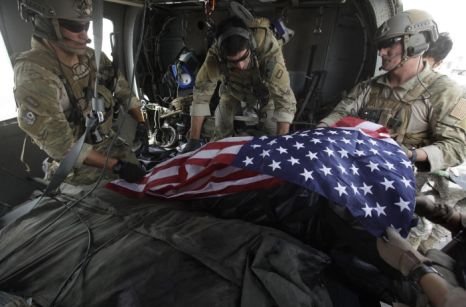
Kabul, October 1: Two Americans were killed in Afghanistan during an exchange of fire between NATO-led forces and the Afghan army that may have been the result of a misunderstanding, as the death toll of US military and civilian personnel passed 2,000.
A US official, who asked not to be identified, said on Sunday that an American soldier and a civilian contractor had been killed in the incident in eastern Afghanistan, the circumstances of which remain unclear.
The coalition initially said the incident may have been the result of an “insider attack” and another example of a member of the Afghan national security force turning on coalition troops in a war that began in 2001.
But it later said that nearby insurgent gunfire may have led to a misunderstanding.
“The circumstances were somewhat confused … There was a report of insurgent firing taking place in this incident which we believe may have been a factor,” Lt. General Adrian Bradshaw, deputy commander of the NATO-led coalition, said.
It was the latest setback for the coalition after the United States said joint operations with Afghan forces were returning to normal.
Joint operations were halted two weeks ago after a surge of attacks on the NATO-led International Security Assistance Force (ISAF) by its Afghan allies. At least 52 ISAF service members have been killed this year in so-called “green-on-blue” attacks.
The suspension of joint operations was a blow for NATO which wants to train the 350,000 members of the Afghan security forces so that they can try to ensure stability after coalition forces withdraw.
Pentagon data listing the number of U.S. troops and U.S. contractors killed in Afghanistan since combat began 11 years ago showed the two new deaths pushed the total combined number of U.S. personnel killed past the 2,000 mark.
The attack took place in the Sayed Abad district of the Wardak province, according to local police sources, who said a gun battle had broken out between coalition soldiers and Afghans when an Afghan National Army member opened fire on American troops.
Three members of the Afghan National Army were also killed in the firefight, while three other U.S. citizens and one Afghan were wounded, police spokesman Wali Mohammad said on Sunday.
“We appreciate the sacrifice of our fallen heroes, every death is tragic and important – none more than any other,” ISAF said in a statement after the incident on Saturday.
Tension between coalition forces and their Afghan allies has been rising due to an escalation of so-called “insider” attacks, but Bradshaw denied the incident was a reflection of growing mistrust between Afghan and coalition forces.
“There is a very strong relationship between ISAF (the International Security Assistance Force) and our Afghan colleagues,” Bradshaw told a press conference late on Sunday.
Separately on Saturday, police in eastern Kunar province said they had found the beheaded bodies of three male civilians in a forest.
The Taliban had kidnapped the men three days ago for allegedly spying for the government and NATO forces, Kunar police chief Shirwah Sameen said.






Comments
Add new comment